Volunteering to help Ukraine’s refugees amid eerie echoes of long-gone Jewish life
‘I wanted to show up as a Jewish person,’ says US doctor working with Israeli group in Poland and Ukraine
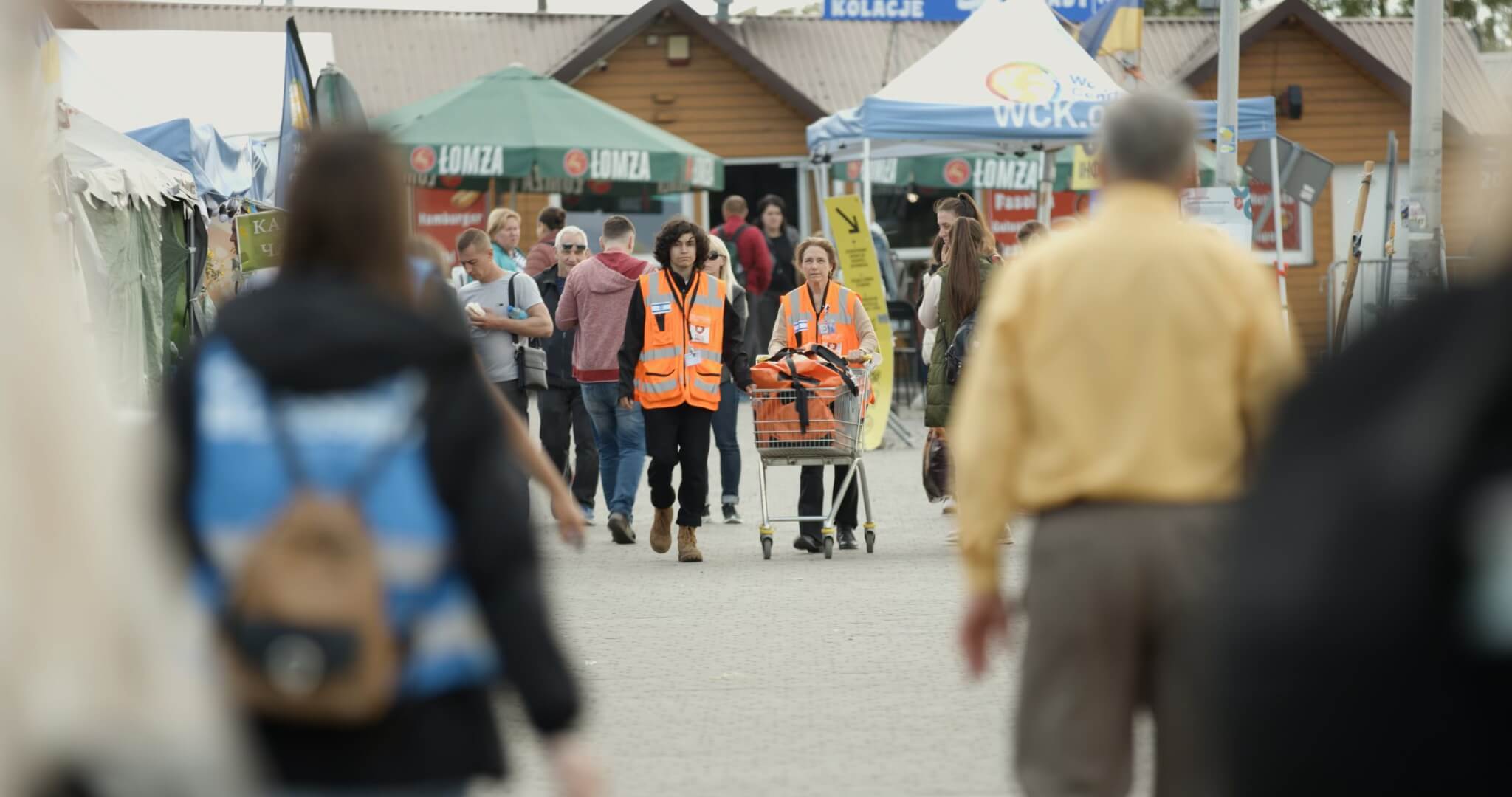
Dr. Paula Rackoff, right, crosses the Ukraine-Poland border, pushing a cart of medical supplies. Courtesy of Lev Echad
Dr. Paula Rackoff and three medical colleagues were driving back from a long day attending to Ukrainian refugees in Poland when they realized they were nearly out of gas.
The past echoed loudly in her mind. “We’re driving past these farms in the middle of the night and I’m thinking, ‘Did that farmer hide Jews? Did this one turn them over to Nazis?’” she said.
They managed to make it back to their hotel running on little more than fumes. But the experience reinforced her motivation for volunteering.
“I wanted to show up as a Jewish person, given the history of the country,” said Rackoff, whose grandmother was from Tarnopol, now part of Ukraine. During the Holocaust, “people weren’t there for us except for Righteous Gentiles. It’s important that Jews show up not as victims, but as people willing to help.”
A weeklong medical mission
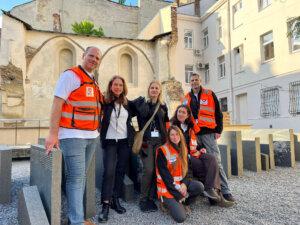
Rackoff, a rheumatologist at NYU-Langone Medical Center in New York City, had planned to spend her summer vacation biking with relatives in Croatia. Instead, she enlisted a small group of doctors to accompany her on a weeklong medical mission to help refugees. She organized the trip through a small Israeli crisis relief group called One Heart, or Lev Echad. While this was the first group of American Jews to go with Lev Echad to Poland and Ukraine, the organization has sent 20 groups of Israelis to help out since the Russian invasion began Feb. 24.
Over the course of the week in late May and early June, Rackoff and her colleagues treated some 300 Ukrainians. Wearing orange vests bearing an Israeli flag and “doctor” in Hebrew, English and Russian, the doctors spent one day in Lviv, Ukraine, and the rest of the time with refugees at various temporary camps in Poland. Some of the refugees have been living in empty schools outfitted with bunk beds, said Rackoff, and others in stately old buildings and Ikea-type structures.
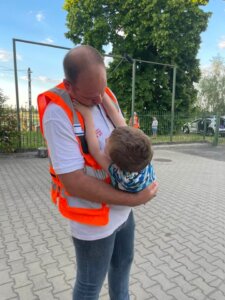
One young boy who hadn’t seen his father since he and his mother fled climbed all over Tomer Dror, Lev Echad’s CEO, when they met. Dror was one of the few men that the child had encountered since leaving home.
More than half of the 8.8 million people who have fled Ukraine as refugees have crossed into Poland, and 90% of them are women and children, as men have stayed back to fight Russian invaders.
The refugees — nearly all women and children – fled the Russian bombing of their homes with only as much as they could carry. None brought enough medication to cover their needs for the months they have been away from home. Rackoff and her colleagues came equipped with antibiotics, blood pressure drugs and anti-inflammatories packed in six large duffel bags. Rackoff had persuaded Dr. Robert Grossman, the dean of NYU School of Medicine, to donate the $20,000 worth of medication.
Accompanying Rackoff were two pain management specialists from New York, Drs. Lauren Shaiova and Eugene Perlov, along with Dr. Debra Luftman, a cosmetic dermatologist from Beverly Hills. All the refugees they saw had high blood pressure, but Luftman turned out to be the busiest one on the team. “So many women had rashes from stress,” said Rackoff.
The origins of One Heart
The organization the doctors worked with, One Heart/Lev Echad, was founded in August 2005, when Israel dismantled 21 Jewish settlements in the Gaza Strip during its withdrawal from the contested territory. At the time, Dror, the CEO of One Heart and a founder of the group, was an 18-year-old Israeli student in Ein Prat, a pre-army leadership training program. Dror and five friends volunteered to help the thousands of Israelis who were uprooted from their homes and resettled in Israel’s south.
“We unpacked their trucks, were a shoulder to cry on and were giving them real hugs,” he said. “We built a closet for them, put a shelf in, were fixing things.” They ran summer camps for the kids living in hotels and recruited 10,000 volunteers to help out through Hanukkah that year, Dror said.
While Dror and his friends served in the army the following year, others from Ein Prat used One Heart’s approach to support Israelis living through bombings in Israel’s north during the second Lebanon war.
“We understood that One Heart is not just an organization of students and youth, but a community aid force for crises,” said Dror. The tax-exempt organization runs on shoestring budget with part-time staff under the aegis of Ein Prat, said Dror. They’ve been activated in at least 10 different emergencies in Israel. Projects have included bringing food and medicine to isolated Israelis during the pandemic shutdown, and reaching out to Holocaust survivors who would otherwise have been alone on Holocaust Memorial Day.
From small emergencies to major projects
Now Dror is working to raise money to respond to a request from the mayor of Lviv, Andriy Sadovyi. “He understands that Israel has the most expertise dealing with the routine of war,” Dror said. The project includes mental health support for kids, building schools that can withstand bombs and bringing in teachers from Israel who speak Russian and Hebrew. He’s raised enough money to serve 64 children so far and hopes to raise more funds to expand the program.
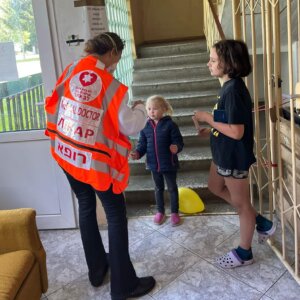
Dror also handles small emergencies — like filling a milk can with gasoline and siphoning it into the car that transported Rackoff and her colleagues after their near-breakdown in the middle of the night in the Polish countryside. Assisting on the medical mission and other work on behalf of the Ukrainian refugees was Shir Diner, a medical student at Ben Gurion University of the Negev.
Offering help, as Jews
Laurie Blitzer and her husband Sam Levine, who, like Rackoff, live on the Upper West Side of Manhattan, went to Poland with Lev Echad around the same time as the doctors. They brought their two college-age children along, built a playground, planted a garden of strawberries and herbs, and held a barbecue with young refugees on Ukrainian National Children’s Day.
“We have been wanting to do something more to help Ukrainians,” said Blitzer, a lay leader with several Jewish organizations including Birthright Israel Foundation, on whose board she serves. She’d raised money for refugee assistance provided by groups like United Hatzolah and United Jewish Appeal, “but we wanted to go hands-on and help. We wanted to help through a Jewish/Israeli organization so that the refugees saw that we, as Jews and through the existence of Israel, are here to help.” She plans to volunteer for another week at the end of July with other Americans and Israelis.
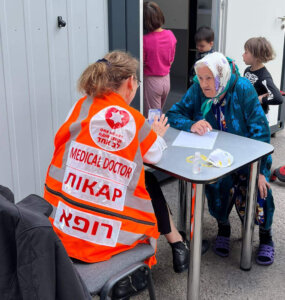
Each One Heart volunteer group trip to Poland starts or ends the trip with a visit to the Auschwitz death camp. Rackoff, who had visited the camp previously, instead went to a small museum in the town of Auschwitz. At the café there, she ordered a bagel. “I had coffee and the best bagel of my life,” she said. “It was so eerie. The food is still there, but the people aren’t.”
Among all the people treated by the medical team, Rackoff said they only encountered one elderly man who was Jewish, and that was in Lviv.
Some of Dror’s family and most of his wife’s family come from Ukraine, including her great-grandfather, who was killed by Ukrainians after the war.
“Eighty years ago, they were killing us,” Dror said, adding: “Now they raise their heads up with bright eyes when they see Israeli flag. That’s the best victory we can have. As Jews we want to set an example to the world. This is why we do what we do.”
The Forward is free to read, but it isn’t free to produce

I hope you appreciated this article. Before you go, I’d like to ask you to please support the Forward.
Now more than ever, American Jews need independent news they can trust, with reporting driven by truth, not ideology. We serve you, not any ideological agenda.
At a time when other newsrooms are closing or cutting back, the Forward has removed its paywall and invested additional resources to report on the ground from Israel and around the U.S. on the impact of the war, rising antisemitism and polarized discourse.
This is a great time to support independent Jewish journalism you rely on. Make a gift today!
— Rachel Fishman Feddersen, Publisher and CEO
Support our mission to tell the Jewish story fully and fairly.
Most Popular
- 1

Fast Forward Ye debuts ‘Heil Hitler’ music video that includes a sample of a Hitler speech
- 2

Opinion It looks like Israel totally underestimated Trump
- 3

Culture Cardinals are Catholic, not Jewish — so why do they all wear yarmulkes?
- 4

Fast Forward Student suspended for ‘F— the Jews’ video defends himself on antisemitic podcast
In Case You Missed It
-

Culture How one Jewish woman fought the Nazis — and helped found a new Italian republic
-

Opinion It looks like Israel totally underestimated Trump
-

Fast Forward Betar ‘almost exclusively triggered’ former student’s detention, judge says
-

Fast Forward ‘Honey, he’s had enough of you’: Trump’s Middle East moves increasingly appear to sideline Israel
-
Shop the Forward Store
100% of profits support our journalism
Republish This Story
Please read before republishing
We’re happy to make this story available to republish for free, unless it originated with JTA, Haaretz or another publication (as indicated on the article) and as long as you follow our guidelines.
You must comply with the following:
- Credit the Forward
- Retain our pixel
- Preserve our canonical link in Google search
- Add a noindex tag in Google search
See our full guidelines for more information, and this guide for detail about canonical URLs.
To republish, copy the HTML by clicking on the yellow button to the right; it includes our tracking pixel, all paragraph styles and hyperlinks, the author byline and credit to the Forward. It does not include images; to avoid copyright violations, you must add them manually, following our guidelines. Please email us at [email protected], subject line “republish,” with any questions or to let us know what stories you’re picking up.
















